Career Development And Systems Theory - PDF
VerifiedAdded on 2021/06/18
|8
|2101
|77
AI Summary
Contribute Materials
Your contribution can guide someone’s learning journey. Share your
documents today.
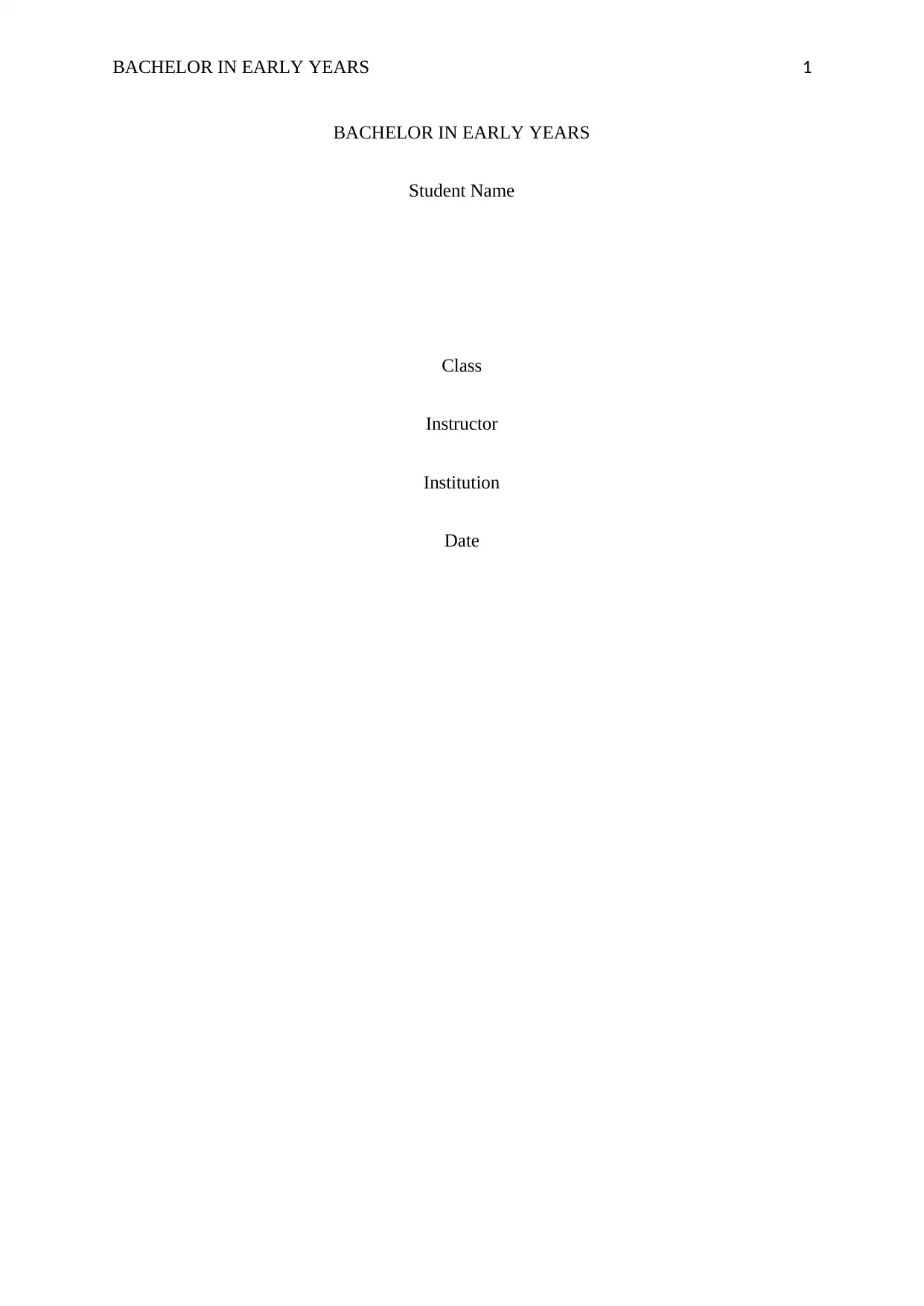
BACHELOR IN EARLY YEARS 1
BACHELOR IN EARLY YEARS
Student Name
Class
Instructor
Institution
Date
BACHELOR IN EARLY YEARS
Student Name
Class
Instructor
Institution
Date
Secure Best Marks with AI Grader
Need help grading? Try our AI Grader for instant feedback on your assignments.
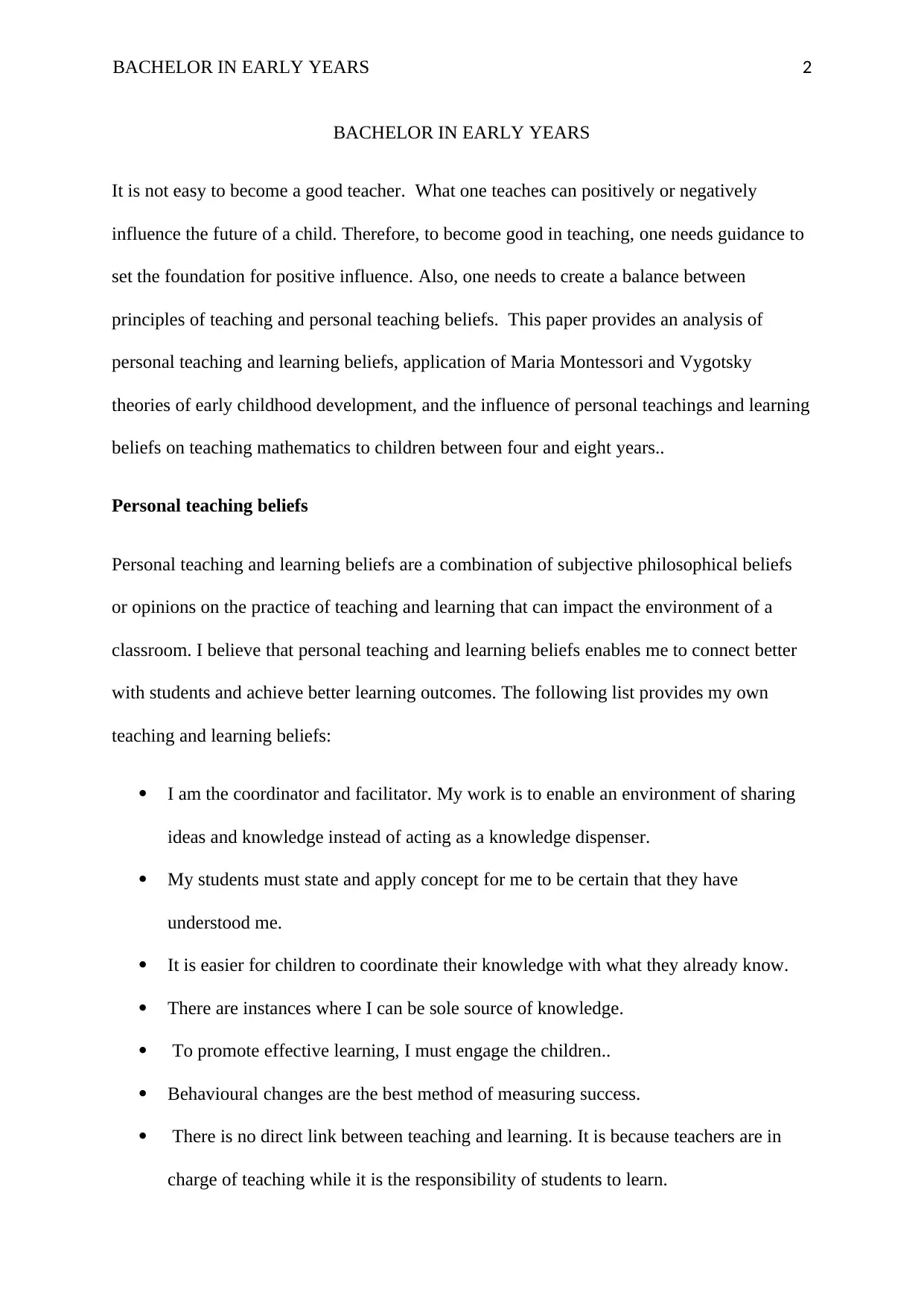
BACHELOR IN EARLY YEARS 2
BACHELOR IN EARLY YEARS
It is not easy to become a good teacher. What one teaches can positively or negatively
influence the future of a child. Therefore, to become good in teaching, one needs guidance to
set the foundation for positive influence. Also, one needs to create a balance between
principles of teaching and personal teaching beliefs. This paper provides an analysis of
personal teaching and learning beliefs, application of Maria Montessori and Vygotsky
theories of early childhood development, and the influence of personal teachings and learning
beliefs on teaching mathematics to children between four and eight years..
Personal teaching beliefs
Personal teaching and learning beliefs are a combination of subjective philosophical beliefs
or opinions on the practice of teaching and learning that can impact the environment of a
classroom. I believe that personal teaching and learning beliefs enables me to connect better
with students and achieve better learning outcomes. The following list provides my own
teaching and learning beliefs:
I am the coordinator and facilitator. My work is to enable an environment of sharing
ideas and knowledge instead of acting as a knowledge dispenser.
My students must state and apply concept for me to be certain that they have
understood me.
It is easier for children to coordinate their knowledge with what they already know.
There are instances where I can be sole source of knowledge.
To promote effective learning, I must engage the children..
Behavioural changes are the best method of measuring success.
There is no direct link between teaching and learning. It is because teachers are in
charge of teaching while it is the responsibility of students to learn.
BACHELOR IN EARLY YEARS
It is not easy to become a good teacher. What one teaches can positively or negatively
influence the future of a child. Therefore, to become good in teaching, one needs guidance to
set the foundation for positive influence. Also, one needs to create a balance between
principles of teaching and personal teaching beliefs. This paper provides an analysis of
personal teaching and learning beliefs, application of Maria Montessori and Vygotsky
theories of early childhood development, and the influence of personal teachings and learning
beliefs on teaching mathematics to children between four and eight years..
Personal teaching beliefs
Personal teaching and learning beliefs are a combination of subjective philosophical beliefs
or opinions on the practice of teaching and learning that can impact the environment of a
classroom. I believe that personal teaching and learning beliefs enables me to connect better
with students and achieve better learning outcomes. The following list provides my own
teaching and learning beliefs:
I am the coordinator and facilitator. My work is to enable an environment of sharing
ideas and knowledge instead of acting as a knowledge dispenser.
My students must state and apply concept for me to be certain that they have
understood me.
It is easier for children to coordinate their knowledge with what they already know.
There are instances where I can be sole source of knowledge.
To promote effective learning, I must engage the children..
Behavioural changes are the best method of measuring success.
There is no direct link between teaching and learning. It is because teachers are in
charge of teaching while it is the responsibility of students to learn.
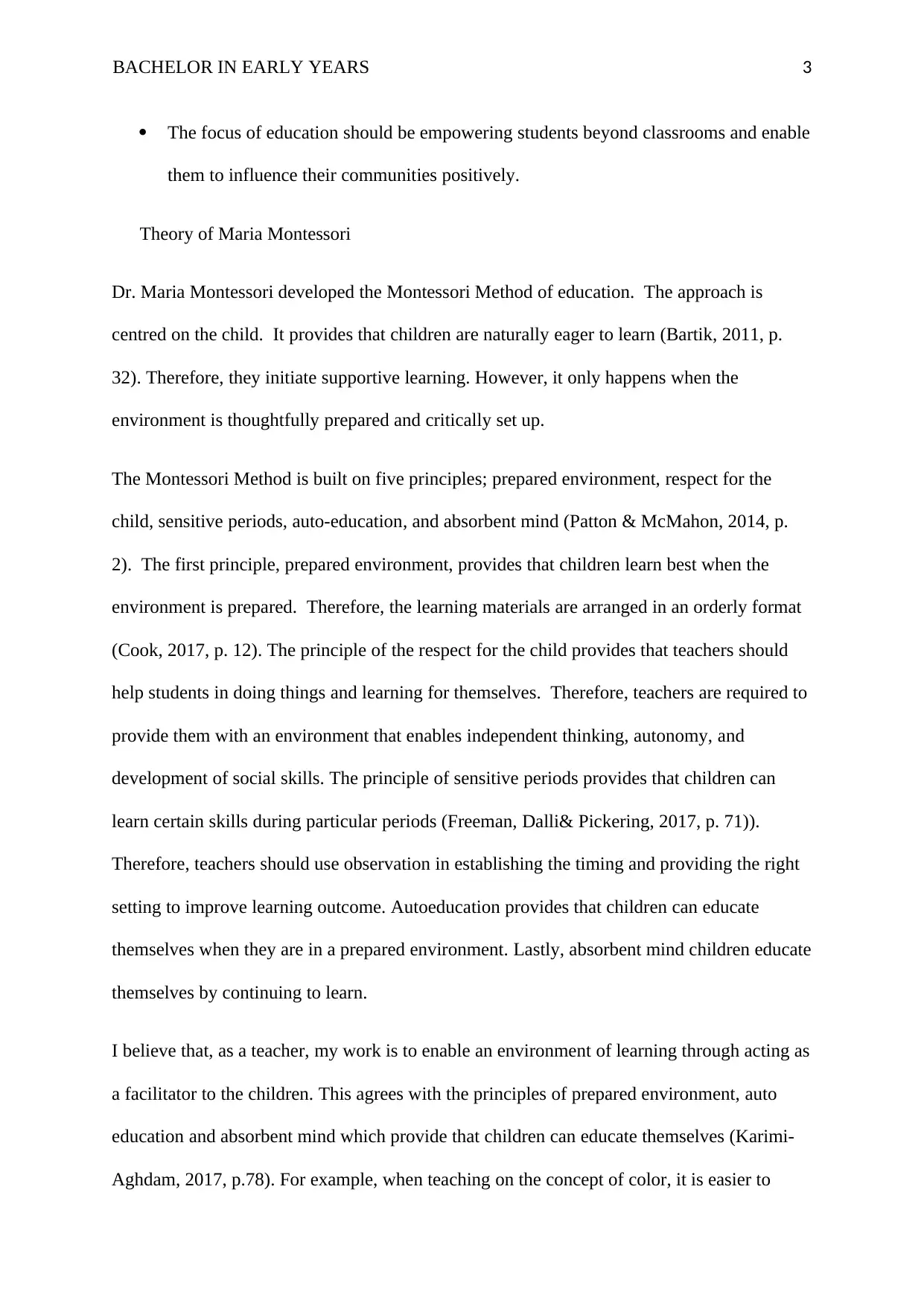
BACHELOR IN EARLY YEARS 3
The focus of education should be empowering students beyond classrooms and enable
them to influence their communities positively.
Theory of Maria Montessori
Dr. Maria Montessori developed the Montessori Method of education. The approach is
centred on the child. It provides that children are naturally eager to learn (Bartik, 2011, p.
32). Therefore, they initiate supportive learning. However, it only happens when the
environment is thoughtfully prepared and critically set up.
The Montessori Method is built on five principles; prepared environment, respect for the
child, sensitive periods, auto-education, and absorbent mind (Patton & McMahon, 2014, p.
2). The first principle, prepared environment, provides that children learn best when the
environment is prepared. Therefore, the learning materials are arranged in an orderly format
(Cook, 2017, p. 12). The principle of the respect for the child provides that teachers should
help students in doing things and learning for themselves. Therefore, teachers are required to
provide them with an environment that enables independent thinking, autonomy, and
development of social skills. The principle of sensitive periods provides that children can
learn certain skills during particular periods (Freeman, Dalli& Pickering, 2017, p. 71)).
Therefore, teachers should use observation in establishing the timing and providing the right
setting to improve learning outcome. Autoeducation provides that children can educate
themselves when they are in a prepared environment. Lastly, absorbent mind children educate
themselves by continuing to learn.
I believe that, as a teacher, my work is to enable an environment of learning through acting as
a facilitator to the children. This agrees with the principles of prepared environment, auto
education and absorbent mind which provide that children can educate themselves (Karimi-
Aghdam, 2017, p.78). For example, when teaching on the concept of color, it is easier to
The focus of education should be empowering students beyond classrooms and enable
them to influence their communities positively.
Theory of Maria Montessori
Dr. Maria Montessori developed the Montessori Method of education. The approach is
centred on the child. It provides that children are naturally eager to learn (Bartik, 2011, p.
32). Therefore, they initiate supportive learning. However, it only happens when the
environment is thoughtfully prepared and critically set up.
The Montessori Method is built on five principles; prepared environment, respect for the
child, sensitive periods, auto-education, and absorbent mind (Patton & McMahon, 2014, p.
2). The first principle, prepared environment, provides that children learn best when the
environment is prepared. Therefore, the learning materials are arranged in an orderly format
(Cook, 2017, p. 12). The principle of the respect for the child provides that teachers should
help students in doing things and learning for themselves. Therefore, teachers are required to
provide them with an environment that enables independent thinking, autonomy, and
development of social skills. The principle of sensitive periods provides that children can
learn certain skills during particular periods (Freeman, Dalli& Pickering, 2017, p. 71)).
Therefore, teachers should use observation in establishing the timing and providing the right
setting to improve learning outcome. Autoeducation provides that children can educate
themselves when they are in a prepared environment. Lastly, absorbent mind children educate
themselves by continuing to learn.
I believe that, as a teacher, my work is to enable an environment of learning through acting as
a facilitator to the children. This agrees with the principles of prepared environment, auto
education and absorbent mind which provide that children can educate themselves (Karimi-
Aghdam, 2017, p.78). For example, when teaching on the concept of color, it is easier to
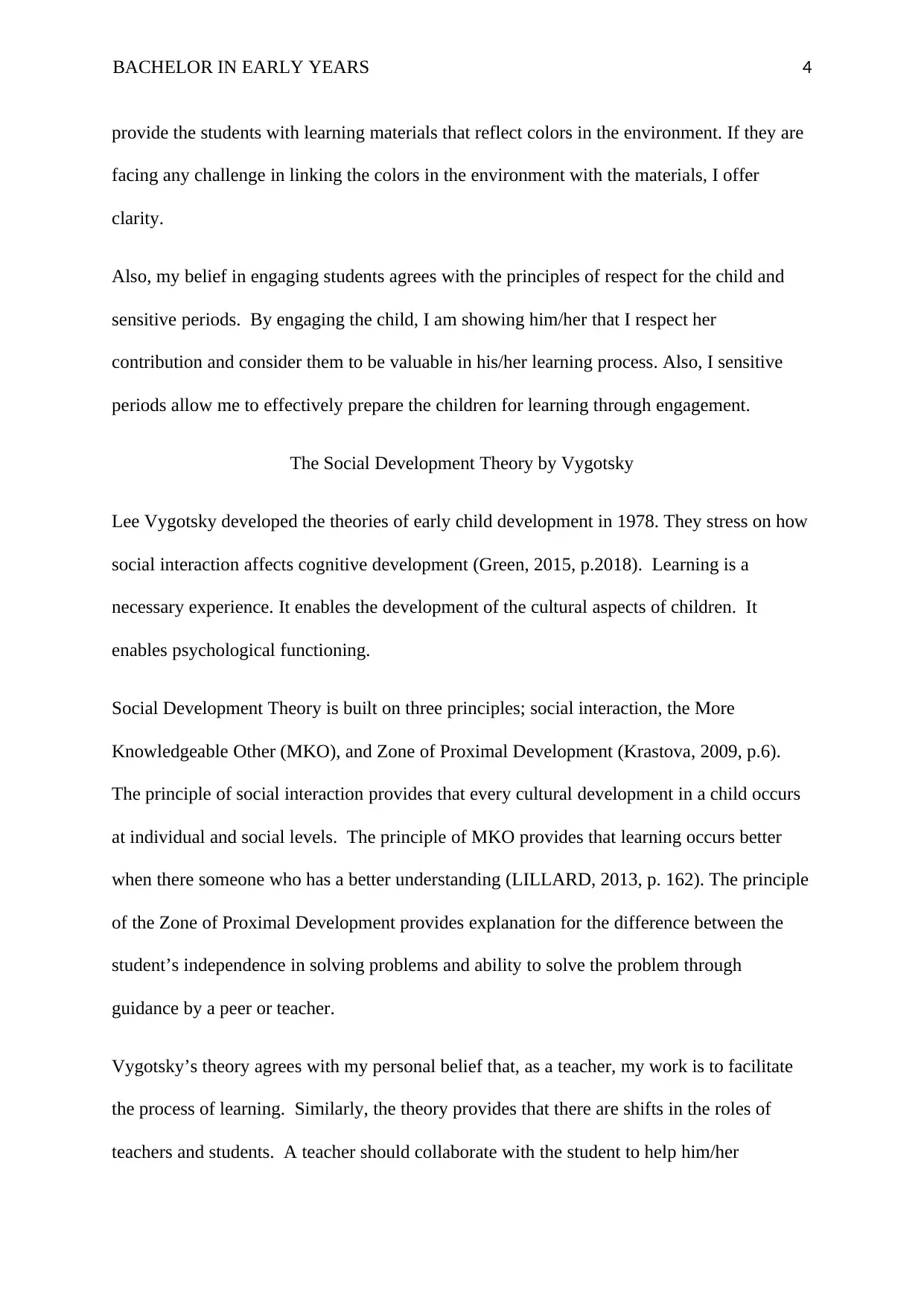
BACHELOR IN EARLY YEARS 4
provide the students with learning materials that reflect colors in the environment. If they are
facing any challenge in linking the colors in the environment with the materials, I offer
clarity.
Also, my belief in engaging students agrees with the principles of respect for the child and
sensitive periods. By engaging the child, I am showing him/her that I respect her
contribution and consider them to be valuable in his/her learning process. Also, I sensitive
periods allow me to effectively prepare the children for learning through engagement.
The Social Development Theory by Vygotsky
Lee Vygotsky developed the theories of early child development in 1978. They stress on how
social interaction affects cognitive development (Green, 2015, p.2018). Learning is a
necessary experience. It enables the development of the cultural aspects of children. It
enables psychological functioning.
Social Development Theory is built on three principles; social interaction, the More
Knowledgeable Other (MKO), and Zone of Proximal Development (Krastova, 2009, p.6).
The principle of social interaction provides that every cultural development in a child occurs
at individual and social levels. The principle of MKO provides that learning occurs better
when there someone who has a better understanding (LILLARD, 2013, p. 162). The principle
of the Zone of Proximal Development provides explanation for the difference between the
student’s independence in solving problems and ability to solve the problem through
guidance by a peer or teacher.
Vygotsky’s theory agrees with my personal belief that, as a teacher, my work is to facilitate
the process of learning. Similarly, the theory provides that there are shifts in the roles of
teachers and students. A teacher should collaborate with the student to help him/her
provide the students with learning materials that reflect colors in the environment. If they are
facing any challenge in linking the colors in the environment with the materials, I offer
clarity.
Also, my belief in engaging students agrees with the principles of respect for the child and
sensitive periods. By engaging the child, I am showing him/her that I respect her
contribution and consider them to be valuable in his/her learning process. Also, I sensitive
periods allow me to effectively prepare the children for learning through engagement.
The Social Development Theory by Vygotsky
Lee Vygotsky developed the theories of early child development in 1978. They stress on how
social interaction affects cognitive development (Green, 2015, p.2018). Learning is a
necessary experience. It enables the development of the cultural aspects of children. It
enables psychological functioning.
Social Development Theory is built on three principles; social interaction, the More
Knowledgeable Other (MKO), and Zone of Proximal Development (Krastova, 2009, p.6).
The principle of social interaction provides that every cultural development in a child occurs
at individual and social levels. The principle of MKO provides that learning occurs better
when there someone who has a better understanding (LILLARD, 2013, p. 162). The principle
of the Zone of Proximal Development provides explanation for the difference between the
student’s independence in solving problems and ability to solve the problem through
guidance by a peer or teacher.
Vygotsky’s theory agrees with my personal belief that, as a teacher, my work is to facilitate
the process of learning. Similarly, the theory provides that there are shifts in the roles of
teachers and students. A teacher should collaborate with the student to help him/her
Secure Best Marks with AI Grader
Need help grading? Try our AI Grader for instant feedback on your assignments.
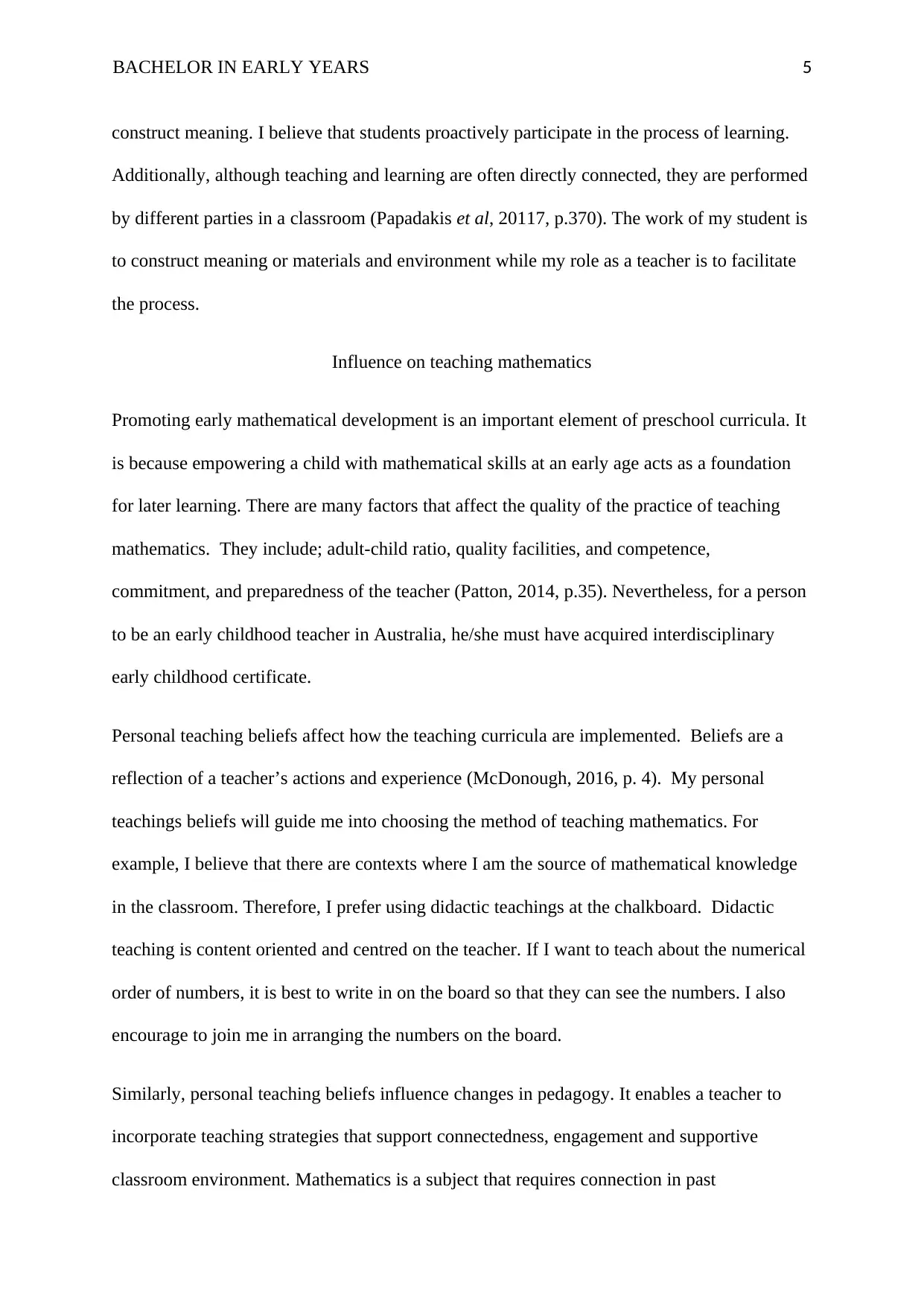
BACHELOR IN EARLY YEARS 5
construct meaning. I believe that students proactively participate in the process of learning.
Additionally, although teaching and learning are often directly connected, they are performed
by different parties in a classroom (Papadakis et al, 20117, p.370). The work of my student is
to construct meaning or materials and environment while my role as a teacher is to facilitate
the process.
Influence on teaching mathematics
Promoting early mathematical development is an important element of preschool curricula. It
is because empowering a child with mathematical skills at an early age acts as a foundation
for later learning. There are many factors that affect the quality of the practice of teaching
mathematics. They include; adult-child ratio, quality facilities, and competence,
commitment, and preparedness of the teacher (Patton, 2014, p.35). Nevertheless, for a person
to be an early childhood teacher in Australia, he/she must have acquired interdisciplinary
early childhood certificate.
Personal teaching beliefs affect how the teaching curricula are implemented. Beliefs are a
reflection of a teacher’s actions and experience (McDonough, 2016, p. 4). My personal
teachings beliefs will guide me into choosing the method of teaching mathematics. For
example, I believe that there are contexts where I am the source of mathematical knowledge
in the classroom. Therefore, I prefer using didactic teachings at the chalkboard. Didactic
teaching is content oriented and centred on the teacher. If I want to teach about the numerical
order of numbers, it is best to write in on the board so that they can see the numbers. I also
encourage to join me in arranging the numbers on the board.
Similarly, personal teaching beliefs influence changes in pedagogy. It enables a teacher to
incorporate teaching strategies that support connectedness, engagement and supportive
classroom environment. Mathematics is a subject that requires connection in past
construct meaning. I believe that students proactively participate in the process of learning.
Additionally, although teaching and learning are often directly connected, they are performed
by different parties in a classroom (Papadakis et al, 20117, p.370). The work of my student is
to construct meaning or materials and environment while my role as a teacher is to facilitate
the process.
Influence on teaching mathematics
Promoting early mathematical development is an important element of preschool curricula. It
is because empowering a child with mathematical skills at an early age acts as a foundation
for later learning. There are many factors that affect the quality of the practice of teaching
mathematics. They include; adult-child ratio, quality facilities, and competence,
commitment, and preparedness of the teacher (Patton, 2014, p.35). Nevertheless, for a person
to be an early childhood teacher in Australia, he/she must have acquired interdisciplinary
early childhood certificate.
Personal teaching beliefs affect how the teaching curricula are implemented. Beliefs are a
reflection of a teacher’s actions and experience (McDonough, 2016, p. 4). My personal
teachings beliefs will guide me into choosing the method of teaching mathematics. For
example, I believe that there are contexts where I am the source of mathematical knowledge
in the classroom. Therefore, I prefer using didactic teachings at the chalkboard. Didactic
teaching is content oriented and centred on the teacher. If I want to teach about the numerical
order of numbers, it is best to write in on the board so that they can see the numbers. I also
encourage to join me in arranging the numbers on the board.
Similarly, personal teaching beliefs influence changes in pedagogy. It enables a teacher to
incorporate teaching strategies that support connectedness, engagement and supportive
classroom environment. Mathematics is a subject that requires connection in past
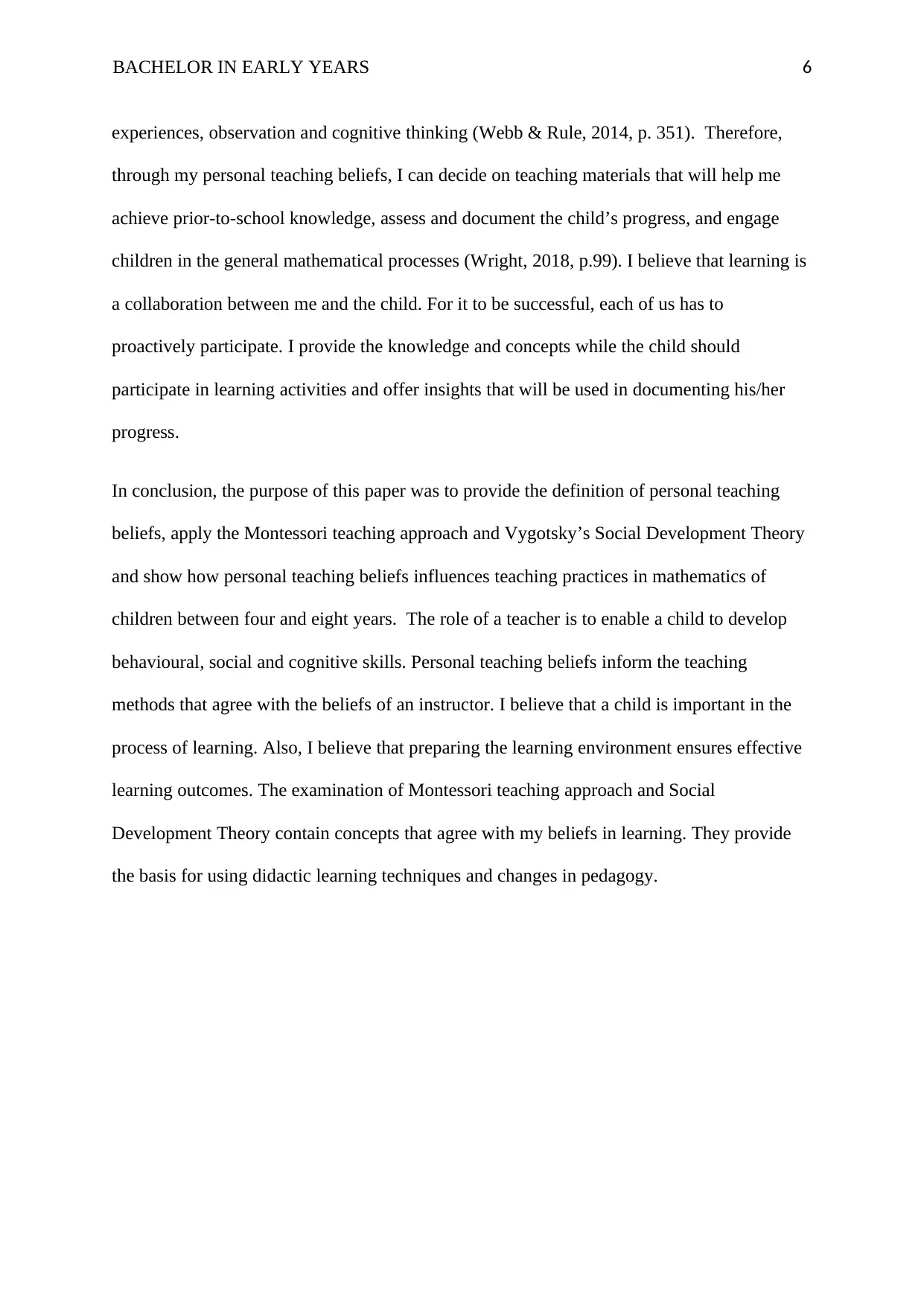
BACHELOR IN EARLY YEARS 6
experiences, observation and cognitive thinking (Webb & Rule, 2014, p. 351). Therefore,
through my personal teaching beliefs, I can decide on teaching materials that will help me
achieve prior-to-school knowledge, assess and document the child’s progress, and engage
children in the general mathematical processes (Wright, 2018, p.99). I believe that learning is
a collaboration between me and the child. For it to be successful, each of us has to
proactively participate. I provide the knowledge and concepts while the child should
participate in learning activities and offer insights that will be used in documenting his/her
progress.
In conclusion, the purpose of this paper was to provide the definition of personal teaching
beliefs, apply the Montessori teaching approach and Vygotsky’s Social Development Theory
and show how personal teaching beliefs influences teaching practices in mathematics of
children between four and eight years. The role of a teacher is to enable a child to develop
behavioural, social and cognitive skills. Personal teaching beliefs inform the teaching
methods that agree with the beliefs of an instructor. I believe that a child is important in the
process of learning. Also, I believe that preparing the learning environment ensures effective
learning outcomes. The examination of Montessori teaching approach and Social
Development Theory contain concepts that agree with my beliefs in learning. They provide
the basis for using didactic learning techniques and changes in pedagogy.
experiences, observation and cognitive thinking (Webb & Rule, 2014, p. 351). Therefore,
through my personal teaching beliefs, I can decide on teaching materials that will help me
achieve prior-to-school knowledge, assess and document the child’s progress, and engage
children in the general mathematical processes (Wright, 2018, p.99). I believe that learning is
a collaboration between me and the child. For it to be successful, each of us has to
proactively participate. I provide the knowledge and concepts while the child should
participate in learning activities and offer insights that will be used in documenting his/her
progress.
In conclusion, the purpose of this paper was to provide the definition of personal teaching
beliefs, apply the Montessori teaching approach and Vygotsky’s Social Development Theory
and show how personal teaching beliefs influences teaching practices in mathematics of
children between four and eight years. The role of a teacher is to enable a child to develop
behavioural, social and cognitive skills. Personal teaching beliefs inform the teaching
methods that agree with the beliefs of an instructor. I believe that a child is important in the
process of learning. Also, I believe that preparing the learning environment ensures effective
learning outcomes. The examination of Montessori teaching approach and Social
Development Theory contain concepts that agree with my beliefs in learning. They provide
the basis for using didactic learning techniques and changes in pedagogy.
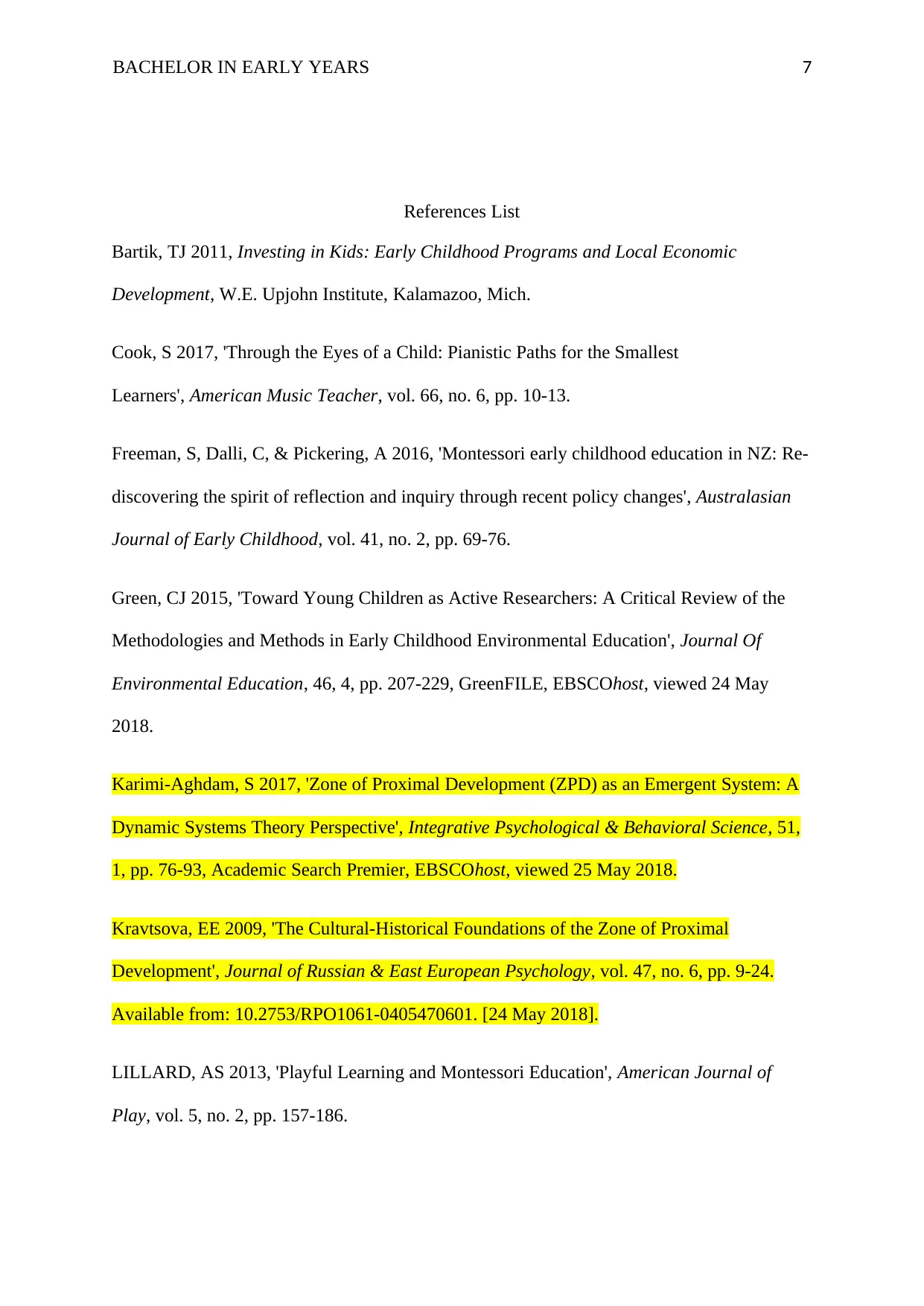
BACHELOR IN EARLY YEARS 7
References List
Bartik, TJ 2011, Investing in Kids: Early Childhood Programs and Local Economic
Development, W.E. Upjohn Institute, Kalamazoo, Mich.
Cook, S 2017, 'Through the Eyes of a Child: Pianistic Paths for the Smallest
Learners', American Music Teacher, vol. 66, no. 6, pp. 10-13.
Freeman, S, Dalli, C, & Pickering, A 2016, 'Montessori early childhood education in NZ: Re-
discovering the spirit of reflection and inquiry through recent policy changes', Australasian
Journal of Early Childhood, vol. 41, no. 2, pp. 69-76.
Green, CJ 2015, 'Toward Young Children as Active Researchers: A Critical Review of the
Methodologies and Methods in Early Childhood Environmental Education', Journal Of
Environmental Education, 46, 4, pp. 207-229, GreenFILE, EBSCOhost, viewed 24 May
2018.
Karimi-Aghdam, S 2017, 'Zone of Proximal Development (ZPD) as an Emergent System: A
Dynamic Systems Theory Perspective', Integrative Psychological & Behavioral Science, 51,
1, pp. 76-93, Academic Search Premier, EBSCOhost, viewed 25 May 2018.
Kravtsova, EE 2009, 'The Cultural-Historical Foundations of the Zone of Proximal
Development', Journal of Russian & East European Psychology, vol. 47, no. 6, pp. 9-24.
Available from: 10.2753/RPO1061-0405470601. [24 May 2018].
LILLARD, AS 2013, 'Playful Learning and Montessori Education', American Journal of
Play, vol. 5, no. 2, pp. 157-186.
References List
Bartik, TJ 2011, Investing in Kids: Early Childhood Programs and Local Economic
Development, W.E. Upjohn Institute, Kalamazoo, Mich.
Cook, S 2017, 'Through the Eyes of a Child: Pianistic Paths for the Smallest
Learners', American Music Teacher, vol. 66, no. 6, pp. 10-13.
Freeman, S, Dalli, C, & Pickering, A 2016, 'Montessori early childhood education in NZ: Re-
discovering the spirit of reflection and inquiry through recent policy changes', Australasian
Journal of Early Childhood, vol. 41, no. 2, pp. 69-76.
Green, CJ 2015, 'Toward Young Children as Active Researchers: A Critical Review of the
Methodologies and Methods in Early Childhood Environmental Education', Journal Of
Environmental Education, 46, 4, pp. 207-229, GreenFILE, EBSCOhost, viewed 24 May
2018.
Karimi-Aghdam, S 2017, 'Zone of Proximal Development (ZPD) as an Emergent System: A
Dynamic Systems Theory Perspective', Integrative Psychological & Behavioral Science, 51,
1, pp. 76-93, Academic Search Premier, EBSCOhost, viewed 25 May 2018.
Kravtsova, EE 2009, 'The Cultural-Historical Foundations of the Zone of Proximal
Development', Journal of Russian & East European Psychology, vol. 47, no. 6, pp. 9-24.
Available from: 10.2753/RPO1061-0405470601. [24 May 2018].
LILLARD, AS 2013, 'Playful Learning and Montessori Education', American Journal of
Play, vol. 5, no. 2, pp. 157-186.
Paraphrase This Document
Need a fresh take? Get an instant paraphrase of this document with our AI Paraphraser
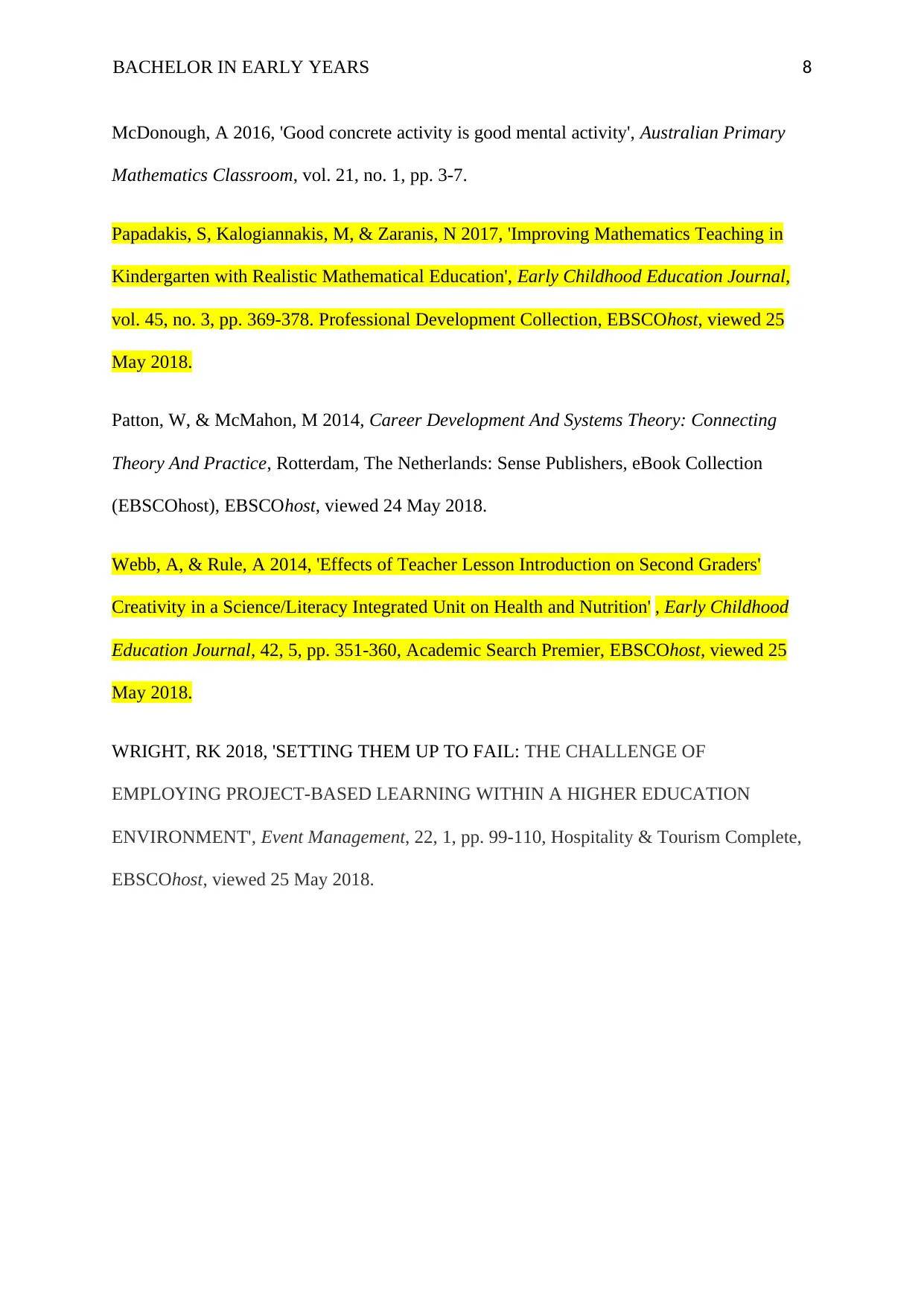
BACHELOR IN EARLY YEARS 8
McDonough, A 2016, 'Good concrete activity is good mental activity', Australian Primary
Mathematics Classroom, vol. 21, no. 1, pp. 3-7.
Papadakis, S, Kalogiannakis, M, & Zaranis, N 2017, 'Improving Mathematics Teaching in
Kindergarten with Realistic Mathematical Education', Early Childhood Education Journal,
vol. 45, no. 3, pp. 369-378. Professional Development Collection, EBSCOhost, viewed 25
May 2018.
Patton, W, & McMahon, M 2014, Career Development And Systems Theory: Connecting
Theory And Practice, Rotterdam, The Netherlands: Sense Publishers, eBook Collection
(EBSCOhost), EBSCOhost, viewed 24 May 2018.
Webb, A, & Rule, A 2014, 'Effects of Teacher Lesson Introduction on Second Graders'
Creativity in a Science/Literacy Integrated Unit on Health and Nutrition' , Early Childhood
Education Journal, 42, 5, pp. 351-360, Academic Search Premier, EBSCOhost, viewed 25
May 2018.
WRIGHT, RK 2018, 'SETTING THEM UP TO FAIL: THE CHALLENGE OF
EMPLOYING PROJECT-BASED LEARNING WITHIN A HIGHER EDUCATION
ENVIRONMENT', Event Management, 22, 1, pp. 99-110, Hospitality & Tourism Complete,
EBSCOhost, viewed 25 May 2018.
McDonough, A 2016, 'Good concrete activity is good mental activity', Australian Primary
Mathematics Classroom, vol. 21, no. 1, pp. 3-7.
Papadakis, S, Kalogiannakis, M, & Zaranis, N 2017, 'Improving Mathematics Teaching in
Kindergarten with Realistic Mathematical Education', Early Childhood Education Journal,
vol. 45, no. 3, pp. 369-378. Professional Development Collection, EBSCOhost, viewed 25
May 2018.
Patton, W, & McMahon, M 2014, Career Development And Systems Theory: Connecting
Theory And Practice, Rotterdam, The Netherlands: Sense Publishers, eBook Collection
(EBSCOhost), EBSCOhost, viewed 24 May 2018.
Webb, A, & Rule, A 2014, 'Effects of Teacher Lesson Introduction on Second Graders'
Creativity in a Science/Literacy Integrated Unit on Health and Nutrition' , Early Childhood
Education Journal, 42, 5, pp. 351-360, Academic Search Premier, EBSCOhost, viewed 25
May 2018.
WRIGHT, RK 2018, 'SETTING THEM UP TO FAIL: THE CHALLENGE OF
EMPLOYING PROJECT-BASED LEARNING WITHIN A HIGHER EDUCATION
ENVIRONMENT', Event Management, 22, 1, pp. 99-110, Hospitality & Tourism Complete,
EBSCOhost, viewed 25 May 2018.
1 out of 8
Related Documents
Your All-in-One AI-Powered Toolkit for Academic Success.
+13062052269
info@desklib.com
Available 24*7 on WhatsApp / Email
![[object Object]](/_next/static/media/star-bottom.7253800d.svg)
Unlock your academic potential
© 2024 | Zucol Services PVT LTD | All rights reserved.




